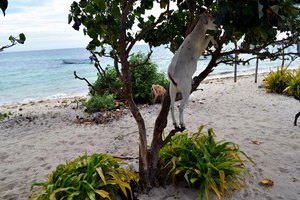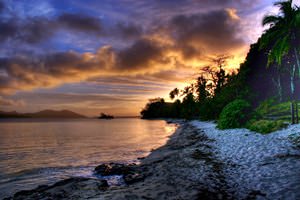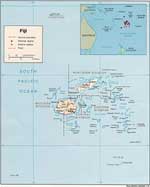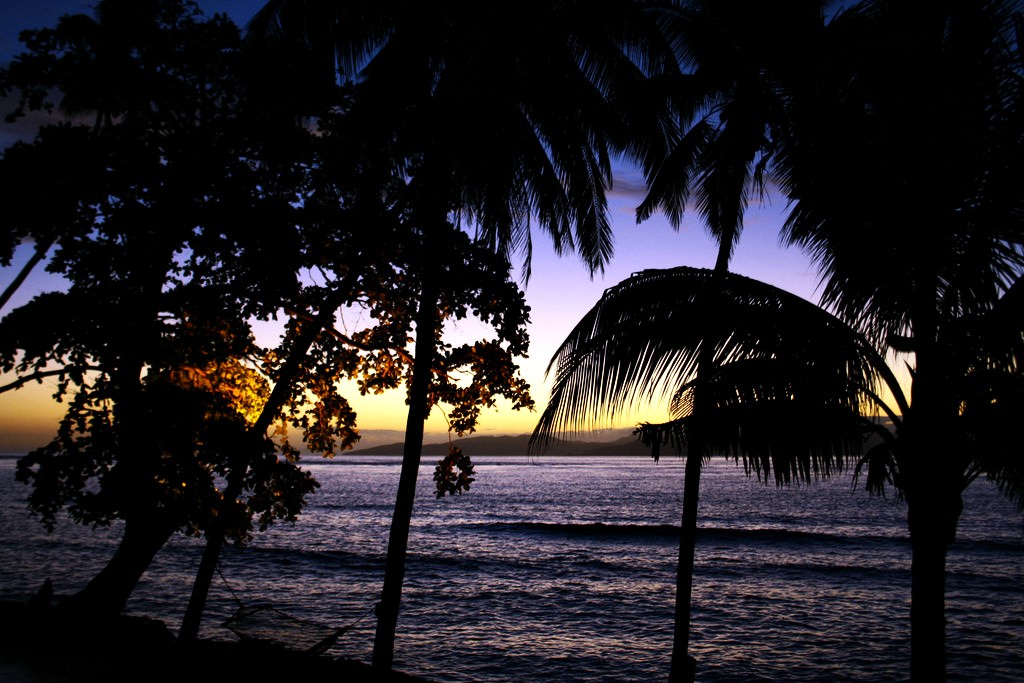National traditions of Fiji. Habits, mentality and the way of living
 Fijians are an original people, whose ancestry came about as a result of the mixing of several ethnic groups of the Pacific Ocean region. In the modern culture of the archipelago, ancient beliefs coexist with Christian customs, and the traditional way of life is mixed with the attributes of a democratic public order. In spite of the historically propagated reputation of being aggressors and cannibals, today’s residents of Fiji are considered one of the friendliest people on the planet. The inhabitants of the islands are the only ones in Oceania, who are genuinely proud of their past. The more respect for local traditions a tourist demonstrates, the more hearty reception he or she receives.
Fijians are an original people, whose ancestry came about as a result of the mixing of several ethnic groups of the Pacific Ocean region. In the modern culture of the archipelago, ancient beliefs coexist with Christian customs, and the traditional way of life is mixed with the attributes of a democratic public order. In spite of the historically propagated reputation of being aggressors and cannibals, today’s residents of Fiji are considered one of the friendliest people on the planet. The inhabitants of the islands are the only ones in Oceania, who are genuinely proud of their past. The more respect for local traditions a tourist demonstrates, the more hearty reception he or she receives.
Fiji is a true paradise for lovers of active leisure. On the archipelago, have been created amazing conditions for surfing and windsurfing, diving, …
Read further
Read further
1. For beach holidays, it is best to travel to Fiji anytime from June to October as hurricanes often occur on the archipelago from November to April. …
Read further
Read further
 Dance is an integral part of the culture of the Fiji Islands. They are an accompaniment to all the significant events: from birthdays or funerals, to weddings and the conclusion of trade transactions. Traditional men’s dances are the military war styled “sibi” or “meke”, which are performed with spears and shields. Women’s dances include “vata”, formerly served to insult and weaken the spirit of the captives. The song and dance tradition came to the islands with Indian migrants. Missionaries brought with them a culture of religious songs, and today Fijian church choirs have achieved resounding success in different parts of Oceania.
Dance is an integral part of the culture of the Fiji Islands. They are an accompaniment to all the significant events: from birthdays or funerals, to weddings and the conclusion of trade transactions. Traditional men’s dances are the military war styled “sibi” or “meke”, which are performed with spears and shields. Women’s dances include “vata”, formerly served to insult and weaken the spirit of the captives. The song and dance tradition came to the islands with Indian migrants. Missionaries brought with them a culture of religious songs, and today Fijian church choirs have achieved resounding success in different parts of Oceania.
Vacation with children in Fiji is a real adventure as the Islands are blessed with exotic nature, snow-white beaches, a gentle sea, and many options …
Read further
Read further
This article about national traditions in Fiji is protected by the copyright law. You can re-use the content, but only under the condition of placement of an active link to www.orangesmile.com.
Fantastic City Tours and Excursions in Fiji
Preferred to Open 9 New Hotels in 2022
In September 2022, the Sommerro hotel in Oslo will start operating in a carefully restored 1930s Art Deco building. This building is a true landmark of Frogner, a historic neighborhood of the Norwegian capital. A multi-million-dollar renovation carefully turned the largest preservation project in Norway into a modern hotel with 231 rooms, including 56 residences. Preferred will open five more hotels in 2022, namely, The Wall Street Hotel in New York, Amrit Ocean Resort & Residences on Singer Island (Florida, the US), TOA Hotel & Spa in Zanzibar, Pendry hotel in Washington, and Pendry Park City hotel in Utah. Read this
Read this
26.04.2024
In September 2022, the Sommerro hotel in Oslo will start operating in a carefully restored 1930s Art Deco building. This building is a true landmark of Frogner, a historic neighborhood of the Norwegian capital. A multi-million-dollar renovation carefully turned the largest preservation project in Norway into a modern hotel with 231 rooms, including 56 residences. Preferred will open five more hotels in 2022, namely, The Wall Street Hotel in New York, Amrit Ocean Resort & Residences on Singer Island (Florida, the US), TOA Hotel & Spa in Zanzibar, Pendry hotel in Washington, and Pendry Park City hotel in Utah.
26.04.2024
Famous sites of Fiji in pictures
Unique traditions in cities of Fiji
When it comes to the look, everything here is pretty simple – the so called “sulu” skirt is popular among both men and women. Many tourists consider such clothes quite extravagant for men, but the local residents have accustomed to Sulu long ago and even wear in at work. Those, who prefer the European standards, are free to wear pants, which are also considered a common and everyday clothing here. The local residents have already got accustomed to a large number of tourists and … Read more 
The main hunters’ weapon was their voice. They lured tortoises to the coast with their songs and then clumsy and heavy animals were just unable to escape. It should be noted that this amazing hunting skill is improved by local women today. As it is forbidden to hunt rare animals, the locals just demonstrate everyone their unique skills and easily lure curious turtles to the coast. The first European ship boarded the coast in the second half of the 18th century. The first European … Read more 
Tips here are on the average 10-15% and they’re not obligatory. It’s about touristic areas; tips are a rather strange thing in the rest are of the island, especially in the places where native Fijians live. A thank for help out of job description would be really appropriate. You’re likely not to have any troubles with communication here. There’re two official languages on the island, almost everybody speaks English as well as Fijian. However, if you visit local villages, you’ll … Read more 
The official language of the population is English, so you will not have any problems with communication. However, people in local remote villages have a special dialect. There are diverse religious preferences on the island – from pagan tribal cults to various forms of Christianity, Islam and Hinduism. Such a spread also indicates the ethnic difference of the population. Vanua Levu is home to almost a third of the country's population. Today, the people of Fiji are considered to be one of … Read more 
English is not quite traditional in spelling and pronunciation here. But you will be able to understand what you are told or what is indicated in the menu or on the sign. The population is very diverse ethnically. In addition to the natives, people from India, China, Indonesia, Japan, and Australia live here. English is the official language here. Therefore, tourists will not have problems with communication. In addition, the indigenous people use a variety of dialects. Diasporas communicate … Read more 
The locals are quite friendly despite the reputation of brutal warriors and cannibals in the past. They actively greet tourists, shouting "Bula" - "Hello". The locals smile and talk a lot, and wave their hands. They will be happy to help you and even guide you to the right place. Families are traditional here. A man works to get money to support his family. A woman takes care of children and home. Small settlements live together. The chief leads the community. Respect and reverence for him … Read more 


 English
English Russian
Russian Nederlands
Nederlands Deutsch
Deutsch Español
Español Français
Français Türkçe
Türkçe
























